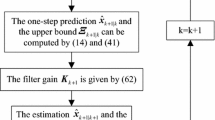Abstract
This paper investigates the problem of real-time estimation for one kind of linear time invariant systems which subject to limited communication capacity. The communication limitations include signal transmission delay, the out-of-sequence measurements and data packet dropout, which appear typically in a network environment. The kernel of filter design is equally to formularize the traditional Kalman filter as one linear weighted summation which is composed of the initial state estimate and all sequential sampled measurements. For it can adapt aforementioned information limitations, the linear weighted summation is then decomposed into two stages. One is a predict-estimator composed by all reached measurements, another is one compensator constructed by those time-delayed data. In the network environment, there are obvious differences between the new hybrid filter and those existing delayed Kalman filters. For example, the novel filter can be optimal in the sense of linear minimum mean square error as soon as all measurements available and has the lowest running time than these existing delayed filters. One simulation, including two cases, is utilized to illustrate the design procedures proposed in this paper.
Similar content being viewed by others
References
R. E. Kalman. A new approach to linear filtering and prediction problems. Transactions of ASME-Journal of Basic Engineering (Series D), 82(1960), 35–45.
Bruno Sinopoli, Luca Schenato, Massimo Franceschetti, Kameshwar Poolla, Michael I. Jordan, and Shankar S. Sastry. Kalman filtering with intermittent observations. IEEE Transactions on Automatic Control, 49(2005)9, 1453–1464.
Huijun Gao and Tongwen Chen. H∞ estimation for uncertain systems with limited communication capacity. IEEE Transactions on Automatic Control, 52(2007)11, 2070–2084.
Ling Shi. Resource optimization for networked estimator with guaranteed estimation quality. [Ph.D. Dissertation], California Institute of Technology, December 2008.
Quanbo Ge. Networked fusion with out-of-sequence information and its applications in ship integrated navigation. [Ph.D. Dissertation], Shanghai Maritime University, China, 2008 (in Chinese). 葛全波. 无序信息的网络融合及在舰船组合导航中的应用. [博士论文]. 上海海事大学, 中国, 2008.
Zhou Wenhui, Li Lin, and Chen Guohai. Optimal update with multistep out-of-sequence measurements in target tracking. 8th International Conference on Signal Processing, Guilin, China, November 16–20, 2006, Vol.4, 16–20.
Y. Bar-Shalom, X. Rong Li, and Thiagaling Kirubarajam. Estimation with Application to Tracking and Navigation. New York, John Wiely&Sons, Inc, 2001, 179–199.
Author information
Authors and Affiliations
Corresponding author
Additional information
Supported by the National Natural Science Foundation of China (No.60804064, 60772006).
Communication author: Wen Chenglin, born in 1963, male, Professor.
About this article
Cite this article
Wen, C., Ge, Q. & Feng, X. Hybrid filter with predict-estimator and compensator for the linear time invariant delayed system. J. Electron.(China) 26, 666–672 (2009). https://doi.org/10.1007/s11767-009-0071-x
Received:
Revised:
Published:
Issue Date:
DOI: https://doi.org/10.1007/s11767-009-0071-x




